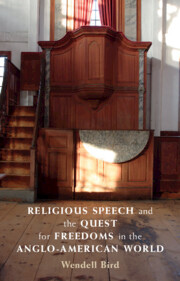Book contents
- Religious Speech and the Quest for Freedoms in the Anglo-American World
- Reviews
- Religious Speech and the Quest for Freedoms in the Anglo-American World
- Copyright page
- Dedication
- Contents
- Figures
- Abbreviations
- Introduction
- 1 The Legacy of Freedom of Speech
- 2 The Legacy of Freedom of Press
- 3 The Legacy of Freedoms for the Criminally Accused
- 4 The Legacy of Higher Education
- 5 The Legacy of Abolition of Slavery
- 6 The Legacy of the Modern Civil Rights Movement
- Epilogue
- Acknowledgments
- Select Bibliography
- Index
2 - The Legacy of Freedom of Press
Published online by Cambridge University Press: 13 April 2023
- Religious Speech and the Quest for Freedoms in the Anglo-American World
- Reviews
- Religious Speech and the Quest for Freedoms in the Anglo-American World
- Copyright page
- Dedication
- Contents
- Figures
- Abbreviations
- Introduction
- 1 The Legacy of Freedom of Speech
- 2 The Legacy of Freedom of Press
- 3 The Legacy of Freedoms for the Criminally Accused
- 4 The Legacy of Higher Education
- 5 The Legacy of Abolition of Slavery
- 6 The Legacy of the Modern Civil Rights Movement
- Epilogue
- Acknowledgments
- Select Bibliography
- Index
Summary
The calls for freedom of press in the mid-seventeenth century, like the earlier calls for freedom of speech, also came mostly from devoutly religious people: Puritans and Nonconformists and their religious-based demands. That religious basis was mostly a desire to disseminate religious preaching and knowledge, and an imperative to do that not only by preaching and other speech but by publishing religious books and pamphlets, in addition to a religious basis in freedom of conscience. John Milton, the trailblazer in seeking "the liberty to know, to utter, and to argue freely according to conscience," tried to extend parrhesia from speech to publications, and built his case in Areopagitica and in other pamphlets on freedom of conscience, on Bible passages, and on similar religious messages. Though Areopagitica is generally described in scholarly literature as unnoticed and overlooked until the end of the seventeenth century, it in fact was relatively widely known, as nearly fifty quotations or allusions show before that century’s end. Besides Milton, other Puritans were the dominant advocates for freedom of press before the end of the seventeenth century, including three who wrote a generation before Milton (an anonymous minister, Leonard Busher, and William Ames), and Levellers and others.
Keywords
- Type
- Chapter
- Information
- Publisher: Cambridge University PressPrint publication year: 2023

